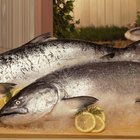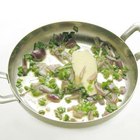Boyrcr420/iStock/GettyImages
Canned food is a modern convenience most of us take for granted, but metal food cans are a surprisingly recent invention. Early versions contained lead, but today's canning materials of steel, tin and aluminum have evolved into products that are lightweight and versatile, and give canned goods a shelf life ranging from one to five years. Metal cans ensure that food is unspoiled, tamper-free and maintains its nutritional value.
The Shiny History of Canned Foods
Canning was first invented because Napoleon needed his armies supplied with unspoiled food. The first versions weren't metal but rather glass containers that kept food from spoiling when the jar was heated with an airtight seal. The next step was to use tin cans, which contained lead. Once that was deemed unsafe, lead-free steel was pressed into service. Today, to kill harmful bacterial, cans go through a variety of processes such as pasteurization, boiling, even irradiation.
Steeled for Success
The majority of cans used for canned foods around the world today are made from steel. Although there is a thin layer of tin on the surface, there is only 5 to 6 pounds of tin per one ton of steel used. Some people still use the term "tin can" to refer to this type of packaging. The Can Manufacturers Institute reports that more than 1,500 types of food items are packed into steel cans of various shapes and sizes. Newer innovations include cans with twist-top, resealable lids, as well as the easy-open type with pull-tabs on the lids. Steel cans are also environmentally-friendly, 100 percent recyclable and made from a minimum of 25 percent recycled content.
Juiced Up Aluminum
Aluminum is preferred for beverages because the metal is easily molded and resistant to corrosion and rust. Aluminum also withstands pressures of up to 90 lbs. per square inch, important for carbonated drinks. Although it's usually easy to tell aluminum cans from steel by sight, one way to differentiate the two is to use a magnet; steel will stick to it, but aluminum won't.
Canned Controversies
Almost all metal food and beverage cans contain an industrial chemical called bisphenol A, or BPA. The chemical is used in epoxy resins that coat the inside of food cans. There is a growing concern from scientists and health organizations like MayoClinic.com that BPA can seep into food or beverages. This is a problem because BPA has been linked to prostate and breast cancer, heart disease and damage to the prostate gland of fetuses, infants and children. To avoid this danger, look for cans labeled BPA-free.
Related Articles

Canned Salmon and Metal Toxins

Are Nickel Lined Pans Safe?

What Are the Dangers of Cooking With ...

Heating Foods in Plastic & BPA

Types of Biodegradable Products

What "Tools of the Trade" Cookware is ...

Is Cooking With Galvanized Aluminum ...

Is Revere Ware Aluminum?

Cooking With Glass Vs. Ceramic

What Are the Dangers of Titanium in ...

What Is Magnalite?

What Is Better for Cookware: Glass, ...

Environmental Impact of Disposable ...

What Are the Best Containers to Freeze ...

The History of Flame-Retardant Clothing

List of Ways to Conserve Mother Nature

What Is Dye Made From?

Alternatives to a Styrofoam Cup

Processed Food Definition

The History of Steel Toe Boots
References
- Johnson and Wales University: The History of Canned Food
- Can Manufacturers Institute: Food Cans Overview
- Can Manufacturers Institute: Facts
- BBC News: The Story of How the Tin Can Nearly Wasn't
- Milwaukee Wisconsin Journal Sentinal: FDA Does About-face on Exposure to BPA
- The Aluminum Association The Aluminum Can
Writer Bio
Bonnie Singleton has been writing professionally since 1996. She has written for various newspapers and magazines including "The Washington Times" and "Woman's World." She also wrote for the BBC-TV news magazine "From Washington" and worked for Discovery Channel online for more than a decade. Singleton holds a master's degree in musicology from Florida State University and is a member of the American Independent Writers.